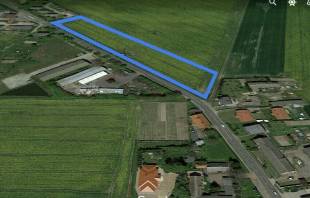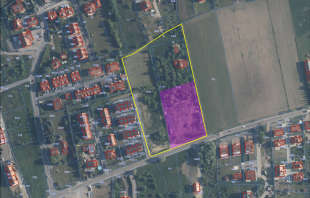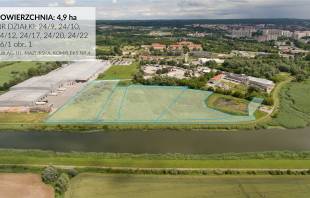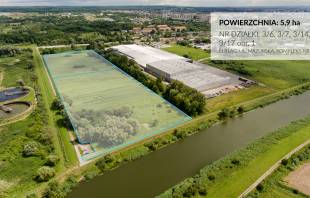Cooperation with e-commerce, interactive galleries, but also strengthening business through the so-called Big Data analysis and faster management – this is only part of the trends changing the real estate market. Reactions to the new phenomena are different. According to Altus Group, 1/3 of the global commercial real estate uses archaic IT solutions to manage investments worth 11 trillion USD. Meanwhile, Chinese Dalian Wanda Group, along with local e-commerce giants, created a company that will support more than 100 shopping malls from its portfolio. Westfield network is developing a special innovation division. A hybrid model, in which traditional players will increasingly focus on the technological aspect of their businesses, is starting to develop on the market.
The impression of transition is intensified by data on attitudes towards technology among the representatives of the global real estate market. Global expenditures on IT of companies from this sector, taking into account the size of the industry, are estimated by Altus Group to be 50% lower than in the case of the financial or public sector. At the same time, 77% of the surveyed companies claim that investments in technology and process optimization are their priority. What is more, global venture capital investments in technologies for real estate reached almost 436 million dollars already in 2014.
- New technological challenges for the commercial real estate markets are associated with both internal activities - relating to the speed and efficiency of management - and with external activities – directed at customers. Digitalisation refers to almost all aspects of human activities, which is reflected at the level of analysis of huge data resources, but it also enters, among others, office buildings and commercial objects - says Wojciech Zielinski, President of Board of MakoLab S.A., a marketing and technology agency offering dedicated IT systems and Web solutions for the commercial real estate industry.
Acceleration with data
IDC estimates that in the last five years, the amount of data on the Internet increased sevenfold. Equally big increases apply to companies that use information that cannot be effectively managed with traditional solutions. Drowning in terabytes of materials relating to transactions, customer relations, action strategy, etc., they must organize their resources. Meanwhile, 3/4 of the commercial real estate market companies do not locate their data in integrated systems, but combine them in many sources, often incompatible with each other.
- We faced a similar challenge in the case of the project for a large developer company with branches in many cities, which had constructed office buildings in excellent locations. During the execution of the project, invoicing and budgeting in the company took place based on local programs, and part of settlements was done with Excel sheets. Our goal was to unify the software used by the company in order to speed up and automate financial and accounting processes. An important part was also the improvement of communication between different divisions – says Wojciech Zieliński.
The customer decided to use ColDis software to fully support and automate processes related to the management of real estate and tenants. The software deployment process lasted 9 months and included the training of the team in such a way that the customer would have full control on the date of completion of the project. The fragmented and inconsistent management program was replaced with a fast, efficient software that improved the company’s business.
In addition to office operators, shopping malls and shopping centres have used ColDis, among others, Arkadia, Wileńska, Zakopianka and Dąbrówka. The largest location supported by the system, Centrum Targowe Ptak, services 4000 tentats. This example shows that, despite all the differences, both office buildings as well as shopping malls generate similar demand for solutions that enable the modernisation of internal processes.
There’s no detailed data on the effects of implementation of Big Data technology in the real estate industry. But the reviews of its users are optimistic. International research conducted by Accenture found that 92% of the companies are satisfied with business effects of the implementation of Big Data solutions, and 94% achieved their goals.
Shopping malls and e-commerce – enemies or allies?
E-commerce will gradually displace traditional shops - this thesis is still popular with some enthusiasts of new technologies. Meanwhile, numerous projects and analyses presented by the representatives of the commercial real estate market indicate that Internet trade and “analogue trade” will complement each other. Shopping malls in the world more and more often use e-commerce solutions and technological innovations. On the other hand, actors in the e-commerce market, such as Amazon, create their own physical stores to reinforce their brands.
- Young customers are strongly influenced by technological solutions that combine the traditional model of trade with the modern communication. Despite that, the report of JLL and Atrium Poland titled “Enthusiasts and Regulars. X and Y Generations in shopping malls” shows that the Poles, regardless of their age, love to spend time in shopping malls that, for them, are no longer only a shopping destination. In response to this popularity, we can still see high development activity. Only in 2015, the shopping mall market gained 0.5 million sq.m. of new space, and more than 560.00 sq.m. is under construction. Developers and managers see the changing dynamics of modern sales channels and more willingly implement in shopping malls the latest technological solutions tailored to the needs of modern consumers who use smartphones and seek interesting products via the Internet – comments Anna Bartoszewicz-Wnuk, Director of the Market Research and Consultancy Division at JLL.
An interesting example are the actions of Chinese Dalian Wanda Group, one of the world’s largest holding companies engaged in commercial real estates, hotels, and cinema. It created a joint venture with Tancent Holdings, a social media giant, and with Baidu Inc., the leading search engine in the country. The aim is to run the trading platform Ffan.com, which will allow users to quickly find products that are located in stores in the immediate vicinity of the consumer. The portfolio of more than 100 shopping malls will be promoted among millions of users. One of the examples from the Western market is Westfield Labs - an innovative entity belonging to the Westfield network. Its projects include, among others, ticket-free parking system operated via smartphones, app to order food, as well as app that allows consumers to search for products located in shopping malls.
The growing number of digital initiatives involving commercial networks proves that more and more important will be the business model in which technological solutions are complementary to “physical” sites. This applies not only to commercial buildings, but also to other commercial real estates, such as office buildings.
- During conversations with our partners, we noticed a growing interest in integrating mobile solutions with wireless networks in offices. New apps for better navigation through buildings and easy ordering food, place in the canteen or a parking space are not just a fad, but the actual need for the future. We are already thinking about implementing beacon-based systems. These are electronic devices located in a building, that, via Bluetooth, can send to smartphone apps information about e.g. eco-friendly solutions used in the building or to display tips on how to properly use them. We implemented a similar app in, among others, Corso Court in Prague, and now employees can order not only parking spaces, but also tables at the nearby restaurant or cinema tickets. We are thinking about implementing such solutions in Poland. All these ideas meet the expectations of the increasingly dominant Generation Y that uses technology both in private life and in work – says Ewelina Kałużna, Leasing and Property Management Director at Skanska Property Poland.
Commercial real estates 2.0
The commercial real estate industry is currently experiencing a generation change. Competitive advantage will be created and achieved with data and its analysis, and business models will be transformed in connection with the development of cloud and mobile technology. Both office complexes, as well as shopping malls, cannot be limited to traditional operation models, because they no longer meet the needs of potential tenants. It should be noted, however, that their success will be based not only on technological advantage, but mostly on a harmonious combination of good “traditional” offers with the use of modern tools.
(fot. materiał prasowy)









































